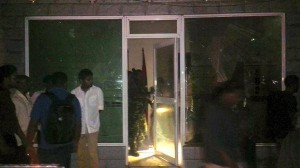Islamic minister Dr Mohamed Shaheem Ali Saeed says proposed legislation to collect, distribute, and manage Zakat would facilitate the collection of MVR500 million annually.
Speaking at a workshop involving stakeholders to the Zakat bill, Shaheem said Zakat systems are protected by law in Saudi Arabia, Bahrain, Sudan, Kuwait, and Malaysia.
“In these countries, Zakat systems have been set up and protected by law, while institutions involved in the management of Zakat have been empowered by law. Hence, it is very important that such a system be organised by law in our 100 percent Muslim country,” he said.
The Islamic ministry collected MVR52 million as Zakat last year.
The comprehensive bill defines Zakat as part of a property that must be given by a Muslim individual or business entity for charity to entitled recipients – which includes the poor, heavily indebted individuals, and travellers.
Zakat payment in the Maldives has traditionally been voluntary, but the new bill makes the annual payment compulsory and imposes a jail term of five years or a fine of MVR500,000 for non-compliance.
Wealth, assets, and income are zakatable – subject to the levy – under the new law. These include precious metal holdings, cash and other securities, trade and business inventories, and earnings from agriculture, fisheries, service delivery and mining.
Draft regulations introduced with the bill propose collecting 2.5 percent of the value of financial assets, business goods, net business profits and rent. The regulations also propose collecting 2.5 percent of net income as Zakat.
Analysis of the bill suggests the legislation avoids double taxation by deducting money collected as Zakat from taxes.
The Islamic ministry is to manage the Zakat fund. Money collected as Zakat is not property of the state and cannot be borrowed by the state for fiscal purposes, the bill said.
Protected by law
The Islamic Ministry must set up a Zakat Management Council to manage Zakat funds under the draft legislation. The council is to be supported through the state budget and advised by a Shariah Advisory Committee, appointed by the Islamic ministry.
Zakatable assets and wealth include gold, silver and other precious metals, cash and other securities, and trade and business inventories.
The persons eligible for Zakat are the poor, paupers, those under bondage, those in heavy debt, “those whose hearts are inclined towards Islam,” travellers and zakat officials. Zakat funds can also be used for ‘fi Sabililah’ (‘in the cause of Allah’) purposes or to defend Islam and improve the well being of Muslims.
The poor and paupers include those who are unable to work due to old age, those who are disabled, widows, and students who have no means of income, or those who do not have a legal benefactor.
It also includes legal guardians who are unable to provide for those under their guardianship, those who are unable to initiate an economic activity due to lack of initial capital, and victims of natural disasters.
When allocating money to the poor, the council must consider other forms of state aid and assistance they receive.
Zakat fund could also be utilised to encourage conversion to Islam, for those who strive to prevent harassment aimed at Muslims by non-Muslims and to assist those who have recently embraced Islam.
Zakat allocated for travellers may be given to Muslims who get stranded and become helpless while travelling for a lawful purpose.
The Zakat Management Council will determine the amount of money to be allocated for each category.
According to the bill, property of the state is not zakatable, while draft regulations say Zakat cannot be levied on property or money obtained via a transaction that is not permissible in Islam.
If a non-Muslim owns shares in a company being valued for Zakat, the value of their shares shall not be included in the valuation for Zakat, the draft regulations state.
Zakat funds are to be deposited in an account called the Baithul Maal as a separate and specialised account with the Maldives Monetary Authority.
The auditor general is to perform an annual audit of the Zakat Management Council under the proposed legislation.
Related to this story
More than 53,000 poor to receive Zakat
Donations made from Zakat fund to children’s home, centre for persons with special need
Alms Act to increase zakat contributions
 (0)Dislikes
(0)Dislikes (0)
(0)
